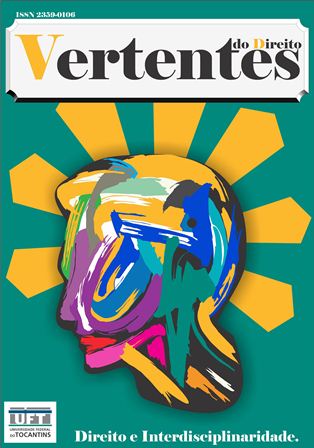JUDGE'S IMPARTIALITY IN THE REQUEST FOR THE OPENING OF POLICE INVESTIGATIONS
DOI:
https://doi.org/10.20873/uft.2359-0106.2022.v9n1.p1-17Keywords:
constitucionalidade, imparcialidade do juiz, inquérito policialAbstract
The accusatory system requires that the judge must be sufficiently removed from the involved and the object of the case to promote their equidistance, leading to a fair trial. Despite this, the art. 5º, II, of the brazilian Criminal Procedure Code (CPP), makes it possible for the judge to request a police investigation, in the event of crimes submitted to public criminal action, which raises doubts about the possible taint of the judge's impartiality and inertia. In this light, the present essay questions the legitimacy of the State-Judge determining that the police chief initiates the police investigation, in the situation indicated. There is a debate about the non-reception by the constitucional order of the signaled legal provision, as well as the exegesis of doctrinal and jurisprudential understandings on the subject. For that, it starts from the application of bibliographic research, based on texts by scholars of the criminal process, in addition to documentary research, qualitatively applied in the confrontation of Brazilian laws and its principles to conclude, at the end, by the real non-reception of art. 5º, II, of the CPP, by the Federal Constitution.
References
BARBOSA, D. M. Processo Penal Contra Autoridades. Editora Gen: São Paulo, 2019.
BRASIL. Decreto-Lei nº 3.689 de 03 de outubro de 1941. Código de Processo Penal brasileiro. In: Diário Oficial da República Federativa do Brasil, Brasília, DF, 03 out. 1941. Disponível em: http://www.planalto.gov.br/ccivil_03/decreto-lei/del3689.htm. Acesso em: 20 mai. 2020.
______. Lei nº 13.964/2019 de 24 de dezembro de 2019. Altera a legislação penal e processual penal brasileira. In: Diário Oficial da República Federativa do Brasil, Brasília, DF, 24 dez. de 2019a. Disponível em: http://www.planalto.gov.br/ccivil_03/_ato2019-2022/2019/lei/L13964.htm. Acesso em: 15 mai. 2020.
______. Supremo Tribunal Federal. Acórdão de decisão que julgou constitucional o artigo 43 do RISTF. Arguição de Descumprimento de Preceito Fundamental nº 572/DF. Kamila Rodrigues Rosenda e Presidente do Supremo Tribunal Federal. Relator: Ministro Edson Fachin. 13 de novembro de 2020. Disponível em: http://portal.stf.jus.br/processos/detalhe.asp?incidente=5658808. Acesso em: 03 dez. 2020.
______. Supremo Tribunal Federal. Acórdão de decisão que reconheceu inconstitucionalidade da figura do juiz de instrução. Ação Declaratória de Inconstitucionalidade nº 1.570-2/DF. Presidente da República e Congresso Nacional. Relator: Ministro Maurício Corrêa. 22 de outubro de 2004. Disponível em: http://redir.stf.jus.br/paginadorpub/paginador.jsp?docTP=AC&docID=385546. Acesso em: 16 fev. 2020.
______. Supremo Tribunal Federal. Inquérito das Fake News. Inquérito nº 4.781/DF. Partes sob sigilo. Relator: Ministro Alexandre de Moraes. 27 de março de 2019b. Disponível em: http://www.stf.jus.br/arquivo/cms/noticiaNoticiaStf/anexo/mandado27maio.pdf. Acesso em: 19 mar. 2020.
______. Supremo Tribunal Federal. Regimento Interno do Supremo Tribunal Federal – RISTF. 2018. Disponível em: http://www.stf.jus.br/arquivo/cms/legislacaoRegimentoInterno/anexo/RISTF.pdf. Acesso em: 20 jun. 2020.
______. Supremo Tribunal Federal. Resolução nº 564 de 06 de novembro de 2015. Regulamenta o exercício do poder de polícia previsto no art. 42, 43, 44 e 45 do Regimento Interno do Supremo Tribunal Federal. In: Diário de Justiça Eletrônico, Brasília, DF, 09 nov. 2015. Disponível em: http://www.stf.jus.br/ARQUIVO/NORMA/RESOLUCAO564-2015.PDF. Acesso em: 22 jun. 2020.
CINTRA, A. C. A.; GRINOVER, A. P.; DINAMARCO, C. R. Teoria Geral do Processo. Editora Malheiros: São Paulo, 2020.
LIMA, R. B. Manual de Processo Penal. Editora Juspodvim: Salvador, 2019.
LOPES JÚNIOR, A. Direito Processual Penal. Editora Saraiva: São Paulo, 2017.
______. Direito Processual Penal. Editora Saraiva: São Paulo, 2020.
MENDES, G. F., BRANCO, P. G. G. Curso de Direito Constitucional. São Paulo: Saraiva, 2017.
NUCCI, G. S. Manual de Direito Penal. Editora GEN: São Paulo, 2018.
TÁVORA, N.; ALENCAR, R. R. Curso de Direito Processual Penal. Editora Juspodivm: Salvador, 2016.
Downloads
Published
How to Cite
Issue
Section
License
Os trabalhos aprovados para publicação tornar-se-ão propriedade da Revista sem qualquer ônus para a mesma. A Equipe Editorial se reserva o direito de promover as adequações necessárias para publicação.
O conteúdo dos trabalhos publicados na Revista Jurídica eletrônica Vertentes do Direito - inclusive quanto à sua veracidade, exatidão e atualização das informações e métodos de pesquisa - é de responsabilidade exclusiva dos autores. As opiniões e conclusões expressas não representam posições da Revista nem da Universidade Federal do Tocantins.
















